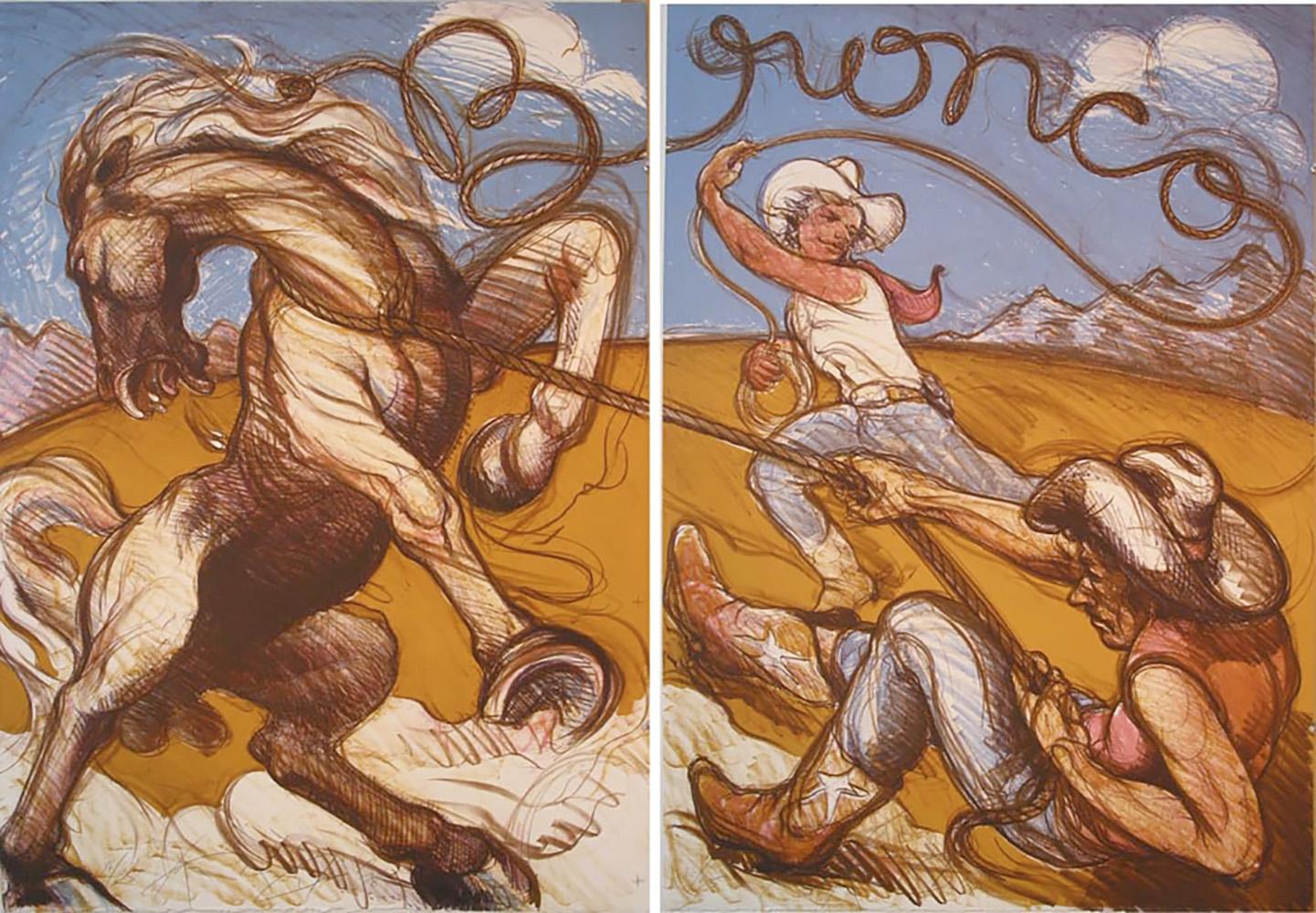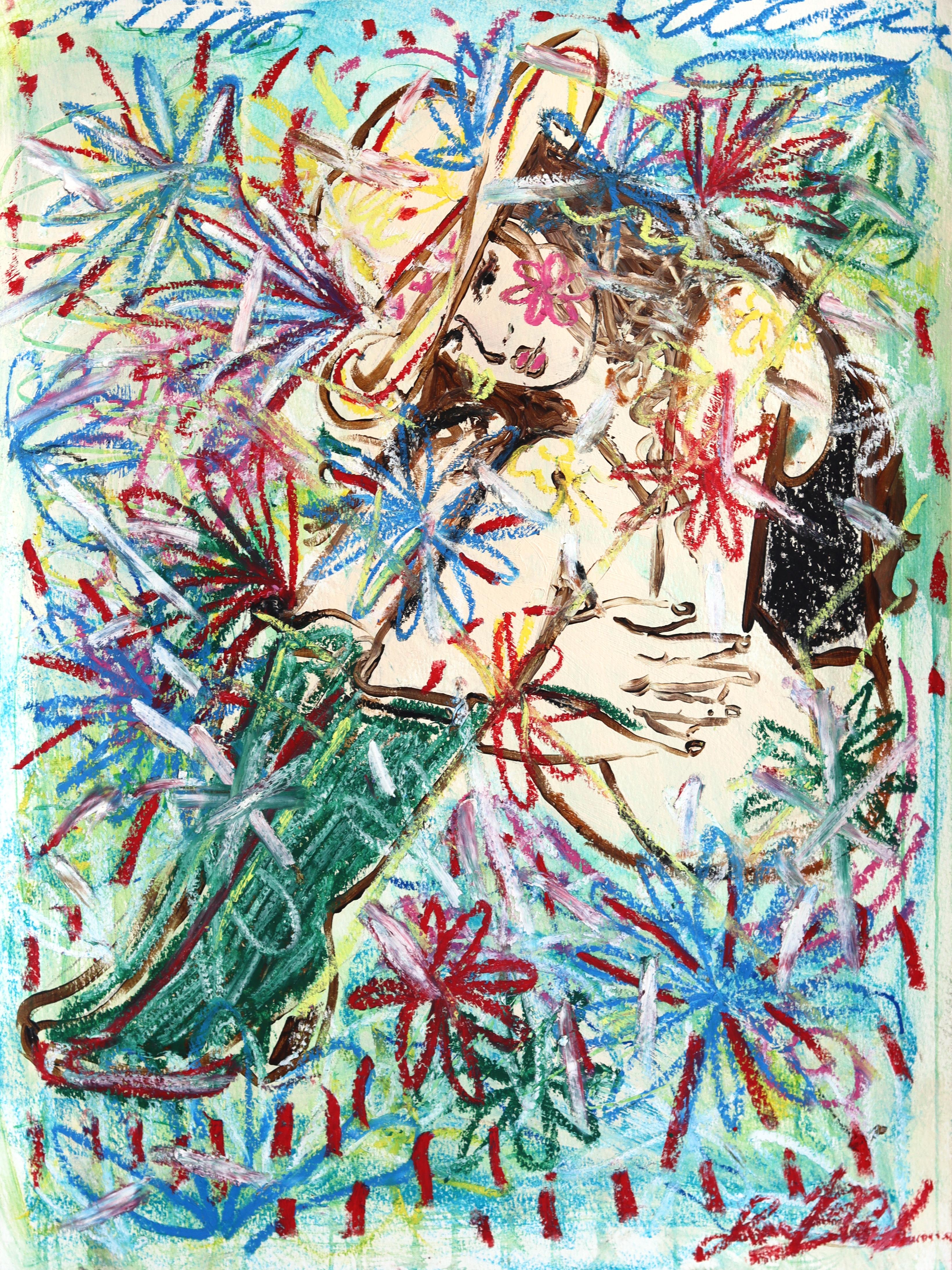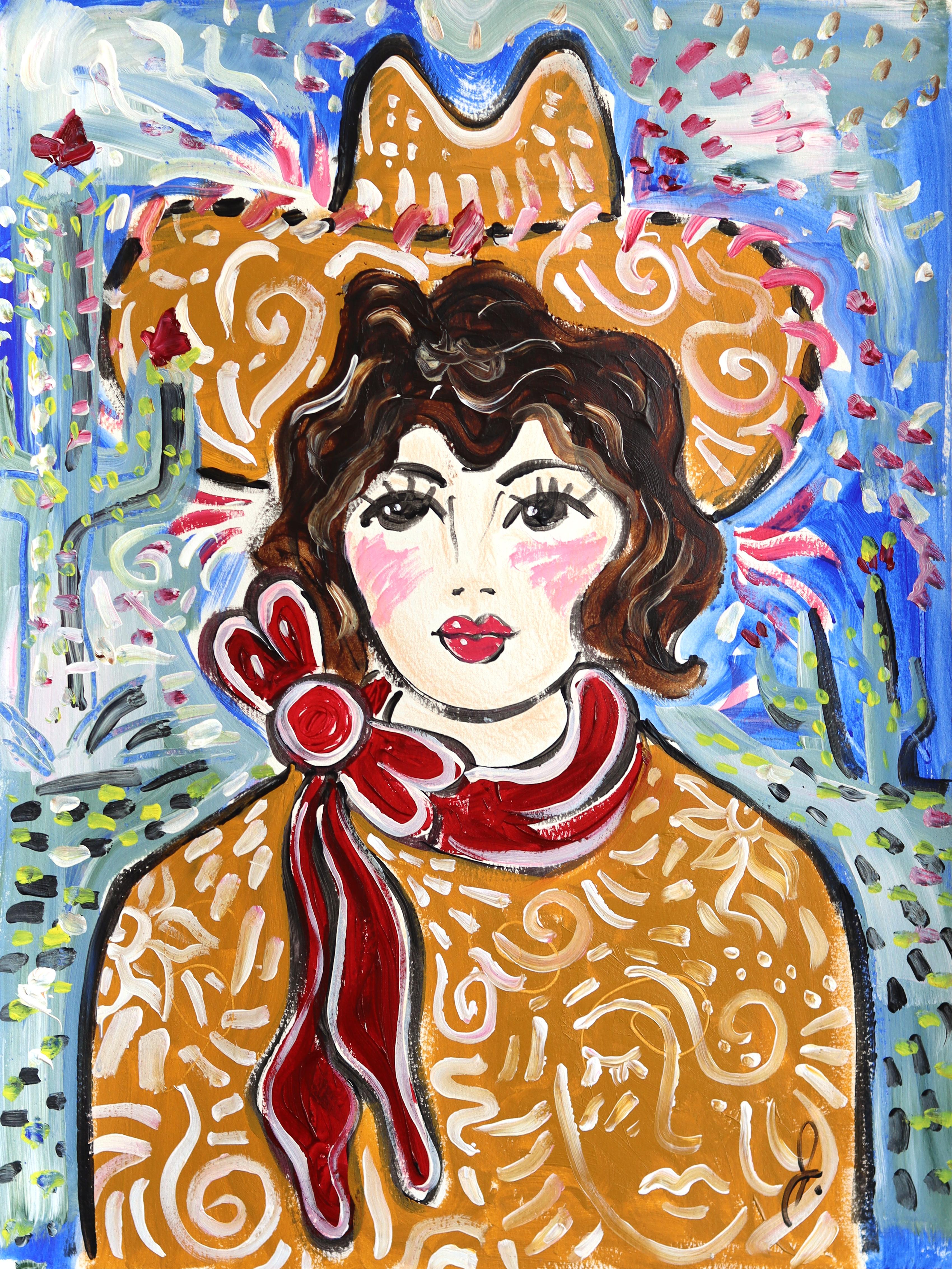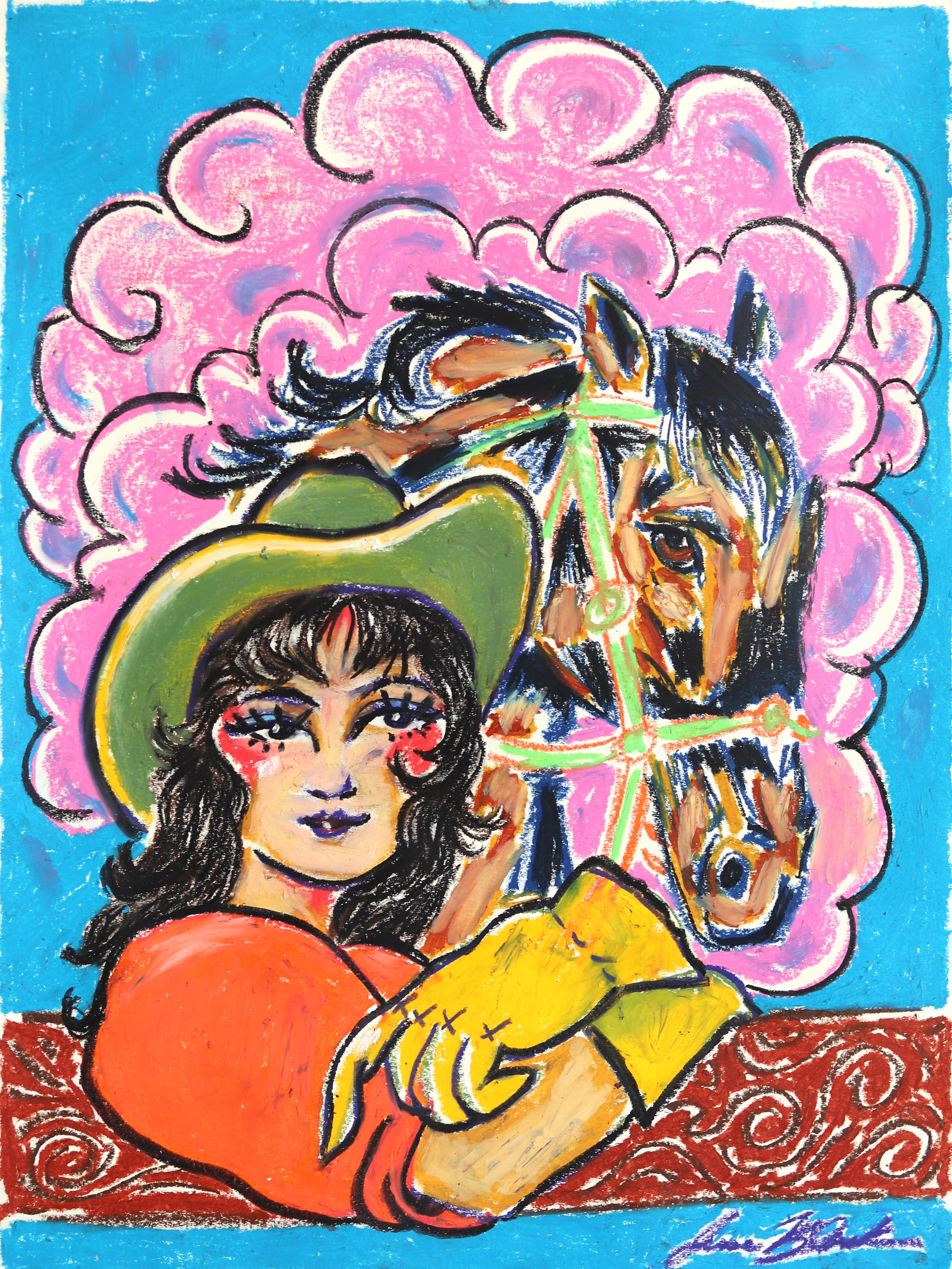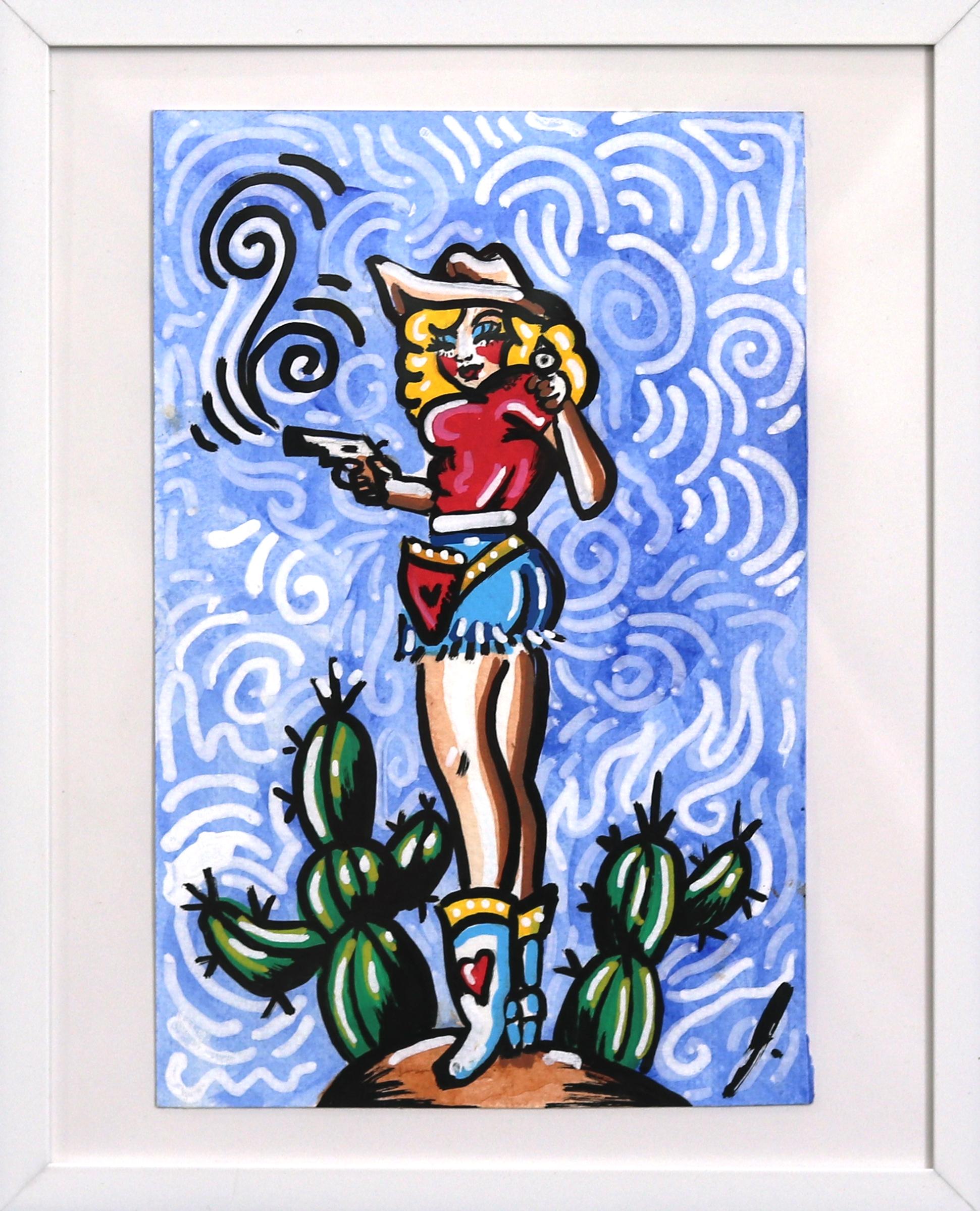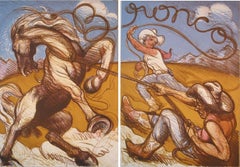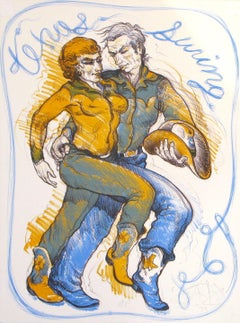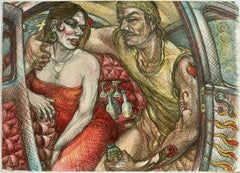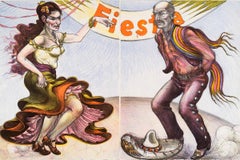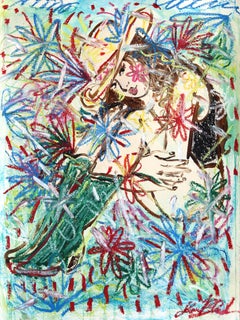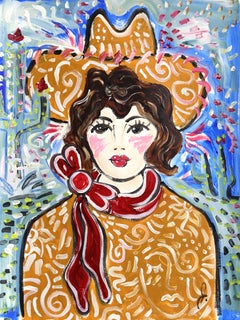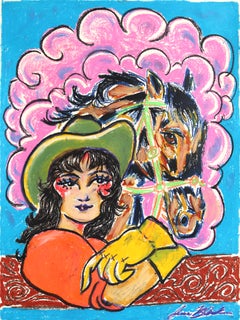Items Similar to Rodeo Queen by Luis Jimenez
Want more images or videos?
Request additional images or videos from the seller
1 of 4
Luis Alfonso JimenezRodeo Queen by Luis Jimenez1981
1981
$13,500
£10,465.12
€11,845.67
CA$19,321.38
A$21,083.94
CHF 10,943.80
MX$252,251.25
NOK 138,911.76
SEK 130,116.86
DKK 88,483.27
About the Item
Rodeo Queen, 1981
Edition 36/50
Signed lower left, Inscribed: for the "Rose" 82.
Provenance: Print was a gift to Rozanne Charington, companion and model for "Rodeo Queen", "Rose Tattoo" and "Jimenez at Adeliza's Candy Store".
Lithograph on paper
42 ½ × 29 in. (107.3 × 73.7 cm)
Luis Alfonso Jimenez
Born, 1940, El Paso, Texas, died 2006, Hondo, New Mexico.
Statement: Luis Jimenez, in his work, celebrates the vitality of life. . . . Jimenez es un hijo de la frontera; he knows its people and the landscape. It is the transformation of these people into art that is his most important contribution to the art of this vast region which stretches between Mexico and the United States.
His subject matter utilizes the popular images of the cultura del norte, and a large part of it is depicted and transformed in the rough and tumble world of la frontera. He is also a son of el norte, and so he uses its materials and explores its emerging, popular myths. The tension and attraction of Jimnez’s work is that he always creates within the space of his two worlds, the Mexicano and the Americano. He constantly shows us the irony of the two forces which repel, while showing us glimpses of the synthesis he seeks. What a gift it has been to us for this talented artist to reflect on the soul of our region. He gives meaning to our existence and history.
Rudolfo Anaya (passage chosen by the artist), A View from La Frontera, Man on Fire: Luis Jimenez, pp. 1, 3, 6Biography: Luis Jimenez was born in Texas to parents who had emigrated from Mexico to the United States; he would later dedicate his 1989 sculpture Border Crossing to his father, who had entered the country illegally. The elder Jimenez was a neon sign designer in El Paso, and Luis worked with him as a youth. His experience working in the neon shop and his fascination with U.S. car culture would both become major influences on his art career.
Jimenez studied architecture at the University of Texas, Austin (UTA), and also took art courses in which he first created sculptures with wood, steel, and fiberglass, choosing the latter because of its association with U.S. popular culture. He subsequently became one of the artists who made fiberglass an acceptable medium in the 1960s. In 1964 Jimenez received his B.S. in art from UTA, and he continued his studies at the Universidad Nacional Autonoma de Mexico in Mexico City.
In 1966 he moved to New York City and worked as an assistant to sculptor Seymour Lipton. Jimenez began to exhibit his art while in New York and in 1972 moved to New Mexico to focus on creating public sculptures, even as he maintained his diverse output of drawings, prints, and lithographs.
Drawing on his early experiences, Jimenez creates works that come from a border perspective, one that draws upon the hybridity bred by culture clashes. Often socially and politically informed, his works speak not only in regional terms, those germane to the southwestern United States, but to broader, more global issues as well. They exhibit a profoundly Chicano aesthetic and sensibility, one that is informed by Mexican and Mexican American traditions, North American popular culture, Chicano cultural icons, and images and themes unique to the Southwest. Death, sexuality, and the struggle of the common people are frequent themes.
Inspired by authors who write in an autobiographical style, Jimenez creates works that function as personal narrative yet are also able to make statements about culture in more global terms. His use of bold colors and lines, a legacy from his fathers work as a neon sign maker, lends a dynamic sensuality to his work, one that is particularly evident in his monumental fiberglass and acrylic urethane sculptural works
Many of Jimenez's works correspond to scholar Toms Ybarra-Fraustos definition of the Chicano aesthetic of rasquachismo, a lowbrow sensibility that appeals to the working class in that it applies to objects that subvert expressions of the mainstream or dominant culture. Creating art that speaks to the people, Jimenez is able to transform regional and culturally specific myths and symbols into globally recognized and relevant icons.
Exhibitions:
In addition to his personal work, Jimenez has been commissioned for numerous public art projects. In 1999 his sculpture Southwest Piet was designated a National Treasure by First Lady Hillary Clinton.
The many exhibitions featuring his work have included Human Concern/Personal Torment (Whitney Museum of American Art, New York, 1969).
The First International Motorcycle Art Show (Phoenix Art Museum, Phoenix, AZ, 1973).
Three Texas Artists (Centre Cultural Americaine, USIS, Paris, 1977),
Recent Trends in Collecting (Smithsonian Institution, Washington, DC, 1982).
Committed to Print (Museum of Modern Art, New York, 1989)
Printmaking in Texas: The 1980s (Modern Art Museum, Fort Worth, TX.
Laguna Gloria Art Museum, Austin, 1990.
The Whitney Biennial (Whitney Museum of American Art, New York, 1991)
Man On Fire: Luis Jimnez (Albuquerque Museum of Art, NM, 1994-95).
47th Annual Purchase Exhibition (American Academy of Arts and Letters, New York, 1995).
Traveling solo exhibition, Working Class Heroes: Images from the Popular Culture (1997-2000).
Jiménez
Collier Gallery has been in continuous operation for over 40 years. Originally located just off Main Street in downtown Scottsdale, Arizona, we have moved to Phoenix to accommodate and showcase our large inventory including:
• Original works by Maynard Dixon, Lon Megargee, Ed Mell, Fritz Scholder, Bill Schenck, Bill Lesch, Luis Jimenez, Greg
Singley, Dan Budnik, and other 20th century Western, WPA and Contemporary Southwestern artists.
• The Fine Art Estate of Lon Megargee
• Vintage rodeo photography from our collection, hand colored, & reproduced in very large format, archival quality.
• Western Antiques and Mid Century Modern furnishing, lighting, lamps and chandeliers from the 40s, 50s and 60s
Michael Collier has over 45 years of fine art expertise and framing design. A custom frame maker offering hand carved, gilded frames, finished in wood tones and genuine gold leaf. Michael has designed original signature frames for artists, museums and premier dealers across the United States. Michael is one of a few people in Arizona who has mastered the skill of hand dying mats and French Matting.
We provide custom picture framing services to designers, museums, galleries, artists, and private collectors. Custom picture and art framing, including original hand carved, gilded frames, mirror frames and special custom leather frames. All picture framing is done to archival standards with a specialty in hand dyed mats and french matting. Custom mirror frames in traditional, contemporary or western styles, designed to fit your home or business. Signature frames for Lon Megargee, Maynard Dixon, Ed Mell and Greg Singley.
All images copyright © 2000-2023 by Michael Collier. Permission to reproduce photos and paintings on this website and online catalog secured by Michael Collier. All rights reserved. No portion of this website and online catalog may be reproduced in any manner whatsoever without written permission from Michael Collier, Collier Gallery.
Disclaimer: Pricing and availability are subject to change without notice; please confirm the description of artwork or item when you contact us.
- Creator:Luis Alfonso Jimenez (1940 - 2006, American)
- Creation Year:1981
- Dimensions:Height: 42.5 in (107.95 cm)Width: 29 in (73.66 cm)
- Medium:
- Movement & Style:
- Period:
- Condition:
- Gallery Location:Phoenix, AZ
- Reference Number:1stDibs: LU2623212834422
About the Seller
No Reviews Yet
Vetted Professional Seller
Every seller passes strict standards for authenticity and reliability
1stDibs seller since 2023
8 sales on 1stDibs
- ShippingRetrieving quote...Shipping from: Phoenix, AZ
- Return Policy
More From This Seller
View AllBronco
Located in Phoenix, AZ
SHIPPING FEES INCLUDE SHIPPING CHARGE, PACKAGING & **INSURANCE**
Luis Alfonso Jimenez
Born, 1940, El Paso, Texas, died 2006, Hondo, New Mexico.
Statement: Luis Jimenez, in his work, celebrates the vitality of life. . . . Jimenez es un hijo de la frontera; he knows its people and the landscape. It is the transformation of these people into art that is his most important contribution to the art of this vast region which stretches between Mexico and the United States.
His subject matter utilizes the popular images of the cultura del norte, and a large part of it is depicted and transformed in the rough and tumble world of la frontera. He is also a son of el norte, and so he uses its materials and explores its emerging, popular myths. The tension and attraction of Jimnez’s work is that he always creates within the space of his two worlds, the Mexicano and the Americano. He constantly shows us the irony of the two forces which repel, while showing us glimpses of the synthesis he seeks. What a gift it has been to us for this talented artist to reflect on the soul of our region. He gives meaning to our existence and history.
Rudolfo Anaya (passage chosen by the artist), A View from La Frontera, Man on Fire: Luis Jimnez, pp. 1, 3, 6Biography: Luis Jimnez was born in Texas to parents who had emigrated from Mexico to the United States; he would later dedicate his 1989 sculpture Border Crossing to his father, who had entered the country illegally. The elder Jimnez was a neon sign designer in El Paso, and Luis worked with him as a youth. His experience working in the neon shop and his fascination with U.S. car culture would both become major influences on his art career.
Jimenez studied architecture at the University of Texas, Austin (UTA), and also took art courses in which he first created sculptures with wood, steel, and fiberglass, choosing the latter because of its association with U.S. popular culture. He subsequently became one of the artists who made fiberglass an acceptable medium in the 1960s. In 1964 Jimenez received his B.S. in art from UTA, and he continued his studies at the Universidad Nacional Autnoma de Mexico in Mexico City.
In 1966 he moved to New York City and worked as an assistant to sculptor Seymour Lipton. Jimnez began to exhibit his art while in New York and in 1972 moved to New Mexico to focus on creating public sculptures, even as he maintained his diverse output of drawings, prints, and lithographs.
Drawing on his early experiences, Jimnez creates works that come from a border perspective, one that draws upon the hybridity bred by culture clashes. Often socially and politically informed, his works speak not only in regional terms, those germane to the southwestern United States, but to broader, more global issues as well. They exhibit a profoundly Chicano aesthetic and sensibility, one that is informed by Mexican and Mexican American traditions, North American popular culture, Chicano cultural icons, and images and themes unique to the Southwest. Death, sexuality, and the struggle of the common people are frequent themes.
Inspired by authors who write in an autobiographical style, Jimnez creates works that function as personal narrative yet are also able to make statements about culture in more global terms. His use of bold colors and lines, a legacy from his fathers work as a neon sign maker, lends a dynamic sensuality to his work, one that is particularly evident in his monumental fiberglass and acrylic urethane sculptural works
Many of Jimnezs works correspond to scholar Toms Ybarra-Fraustos definition of the Chicano aesthetic of rasquachismo, a lowbrow sensibility that appeals to the working class in that it applies to objects that subvert expressions of the mainstream or dominant culture. Creating art that speaks to the people, Jimnez is able to transform regional and culturally specific myths and symbols into globally recognized and relevant icons.
Exhibitions:
In addition to his personal work, Jimnez has been commissioned for numerous public art projects. In 1999 his sculpture Southwest Piet was designated a National Treasure by First Lady Hillary Clinton.
The many exhibitions featuring his work have included Human Concern/Personal Torment (Whitney Museum of American Art, New York, 1969).
The First International Motorcycle Art Show (Phoenix Art Museum, Phoenix, AZ, 1973).
Three Texas Artists (Centre Cultural Americaine, USIS, Paris, 1977),
Recent Trends in Collecting (Smithsonian Institution, Washington, DC, 1982).
Committed to Print (Museum of Modern Art, New York, 1989)
Printmaking in Texas: The 1980s (Modern Art Museum, Fort Worth, TX.
Laguna Gloria Art Museum, Austin, 1990.
The Whitney Biennial (Whitney Museum of American Art, New York, 1991)
Man On Fire: Luis Jimnez (Albuquerque Museum of Art, NM, 1994-95).
47th Annual Purchase Exhibition (American Academy of Arts and Letters, New York, 1995).
Traveling solo exhibition, Working Class Heroes: Images from the Popular Culture (1997-2000).
Jiménez
Collier Gallery has been in continuous operation for over 40 years. Originally located just off Main Street in downtown Scottsdale, Arizona, we have moved to Phoenix to accommodate and showcase our large inventory including:
• Original works by Maynard Dixon, Lon Megargee, Ed Mell, Fritz Scholder, Bill Schenck, Bill Lesch, Luis Jimenez, Greg
Singley, Dan Budnik, and other 20th century Western, WPA and Contemporary Southwestern artists.
• The Fine Art Estate of Lon Megargee
• Vintage rodeo...
Category
1970s Contemporary Figurative Prints
Materials
Lithograph
Texas Swing by Luis Jimenez
By Luis Jiménez
Located in Phoenix, AZ
Texas Swing
Luis Alfonso Jimenez 1940-2006
Stone Lithograph Edition of 50
Artist Proof
24 x 18 inches
Luis Alfonso Jimenez
Born, 1940, El Paso, Texas, died 2006, Hondo, New Mexico.
Statement: Luis Jimenez, in his work, celebrates the vitality of life. . . . Jimenez es un hijo de la frontera; he knows its people and the landscape. It is the transformation of these people into art that is his most important contribution to the art of this vast region which stretches between Mexico and the United States.
His subject matter utilizes the popular images of the cultura del norte, and a large part of it is depicted and transformed in the rough and tumble world of la frontera. He is also a son of el norte, and so he uses its materials and explores its emerging, popular myths. The tension and attraction of Jimnez’s work is that he always creates within the space of his two worlds, the Mexicano and the Americano. He constantly shows us the irony of the two forces which repel, while showing us glimpses of the synthesis he seeks. What a gift it has been to us for this talented artist to reflect on the soul of our region. He gives meaning to our existence and history.
Rudolfo Anaya (passage chosen by the artist), A View from La Frontera, Man on Fire: Luis Jimnez, pp. 1, 3, 6Biography: Luis Jimnez was born in Texas to parents who had emigrated from Mexico to the United States; he would later dedicate his 1989 sculpture Border Crossing to his father, who had entered the country illegally. The elder Jimenez was a neon sign designer in El Paso, and Luis worked with him as a youth. His experience working in the neon shop and his fascination with U.S. car culture would both become major influences on his art career.
Jimenez studied architecture at the University of Texas, Austin (UTA), and also took art courses in which he first created sculptures with wood, steel, and fiberglass, choosing the latter because of its association with U.S. popular culture. He subsequently became one of the artists who made fiberglass an acceptable medium in the 1960s. In 1964 Jimenez received his B.S. in art from UTA, and he continued his studies at the Universidad Nacional Autonoma de Mexico in Mexico City.
In 1966 he moved to New York City and worked as an assistant to sculptor Seymour Lipton. Jimnez began to exhibit his art while in New York and in 1972 moved to New Mexico to focus on creating public sculptures, even as he maintained his diverse output of drawings, prints, and lithographs.
Drawing on his early experiences, Jimenez creates works that come from a border perspective, one that draws upon the hybridity bred by culture clashes. Often socially and politically informed, his works speak not only in regional terms, those germane to the southwestern United States, but to broader, more global issues as well. They exhibit a profoundly Chicano aesthetic and sensibility, one that is informed by Mexican and Mexican American traditions, North American popular culture, Chicano cultural icons, and images and themes unique to the Southwest. Death, sexuality, and the struggle of the common people are frequent themes.
Inspired by authors who write in an autobiographical style, Jimenez creates works that function as personal narrative yet are also able to make statements about culture in more global terms. His use of bold colors and lines, a legacy from his fathers work as a neon sign maker, lends a dynamic sensuality to his work, one that is particularly evident in his monumental fiberglass and acrylic urethane sculptural works
Many of Jimenez's works correspond to scholar Toms Ybarra-Fraustos definition of the Chicano aesthetic of rasquachismo, a lowbrow sensibility that appeals to the working class in that it applies to objects that subvert expressions of the mainstream or dominant culture. Creating art that speaks to the people, Jimenez is able to transform regional and culturally specific myths and symbols into globally recognized and relevant icons.
Exhibitions:
In addition to his personal work, Jimenez has been commissioned for numerous public art projects. In 1999 his sculpture Southwest Piet was designated a National Treasure by First Lady Hillary Clinton.
The many exhibitions featuring his work have included Human Concern/Personal Torment (Whitney Museum of American Art, New York, 1969).
The First International Motorcycle Art Show (Phoenix Art Museum, Phoenix, AZ, 1973).
Three Texas Artists (Centre Cultural Americaine, USIS, Paris, 1977),
Recent Trends in Collecting (Smithsonian Institution, Washington, DC, 1982).
Committed to Print (Museum of Modern Art, New York, 1989)
Printmaking in Texas: The 1980s (Modern Art Museum, Fort Worth, TX.
Laguna Gloria Art Museum, Austin, 1990.
The Whitney Biennial (Whitney Museum of American Art, New York, 1991)
Man On Fire: Luis Jimnez (Albuquerque Museum of Art, NM, 1994-95).
47th Annual Purchase Exhibition (American Academy of Arts and Letters, New York, 1995).
Traveling solo exhibition, Working Class Heroes: Images from the Popular Culture (1997-2000).
Jiménez
Collier Gallery has been in continuous operation for over 40 years. Originally located just off Main Street in downtown Scottsdale, Arizona, we have moved to Phoenix to accommodate and showcase our large inventory including:
• Original works by Maynard Dixon, Lon Megargee, Ed Mell, Fritz Scholder, Bill Schenck, Bill Lesch, Luis Jimenez, Greg
Singley, Dan Budnik, and other 20th century Western, WPA and Contemporary Southwestern artists.
• The Fine Art Estate of Lon Megargee
• Vintage rodeo...
Category
1970s Contemporary Figurative Prints
Materials
Lithograph
Rose Tattoo, Original Drawing by Luis Jimenez
Located in Phoenix, AZ
SHIPPING FEES INCLUDE SHIPPING CHARGE, PACKAGING & **INSURANCE**
Rose Tattoo
Luis Alfonso Jimenez 1940-2006
Color pencil on Arches paper
22 x 30.25 inches
Provenance: The original drawing was owned by Rozanne Charington, companion and model for "Rodeo Queen", "Rose Tattoo" and "Jimenez at Adeliza's Candy Store".
An original Drawing by Luis Jimenez, 1983, 22 x 30.25 inches. A stone lithograph edition was made from this drawing. There was a PBS documentary showing Jimenez drawing on the stone with the drawing in front of him and the making of the lithograph with Sette Publishing.
Luis Alfonso Jimenez
Born, 1940, El Paso, Texas, died 2006, Hondo, New Mexico.
Statement: Luis Jimenez, in his work, celebrates the vitality of life. . . . Jimenez es un hijo de la frontera; he knows its people and the landscape. It is the transformation of these people into art that is his most important contribution to the art of this vast region which stretches between Mexico and the United States.
His subject matter utilizes the popular images of the cultura del norte, and a large part of it is depicted and transformed in the rough and tumble world of la frontera. He is also a son of el norte, and so he uses its materials and explores its emerging, popular myths. The tension and attraction of Jimnez’s work is that he always creates within the space of his two worlds, the Mexicano and the Americano. He constantly shows us the irony of the two forces which repel, while showing us glimpses of the synthesis he seeks. What a gift it has been to us for this talented artist to reflect on the soul of our region. He gives meaning to our existence and history.
Rudolfo Anaya (passage chosen by the artist), A View from La Frontera, Man on Fire: Luis Jimnez, pp. 1, 3, 6Biography: Luis Jimnez was born in Texas to parents who had emigrated from Mexico to the United States; he would later dedicate his 1989 sculpture Border Crossing to his father, who had entered the country illegally. The elder Jimnez was a neon sign designer in El Paso, and Luis worked with him as a youth. His experience working in the neon shop and his fascination with U.S. car culture would both become major influences on his art career.
Jimenez studied architecture at the University of Texas, Austin (UTA), and also took art courses in which he first created sculptures with wood, steel, and fiberglass, choosing the latter because of its association with U.S. popular culture. He subsequently became one of the artists who made fiberglass an acceptable medium in the 1960s. In 1964 Jimenez received his B.S. in art from UTA, and he continued his studies at the Universidad Nacional Autnoma de Mexico in Mexico City.
In 1966 he moved to New York City and worked as an assistant to sculptor Seymour Lipton. Jimnez began to exhibit his art while in New York and in 1972 moved to New Mexico to focus on creating public sculptures, even as he maintained his diverse output of drawings, prints, and lithographs.
Drawing on his early experiences, Jimnez creates works that come from a border perspective, one that draws upon the hybridity bred by culture clashes. Often socially and politically informed, his works speak not only in regional terms, those germane to the southwestern United States, but to broader, more global issues as well. They exhibit a profoundly Chicano aesthetic and sensibility, one that is informed by Mexican and Mexican American traditions, North American popular culture, Chicano cultural icons, and images and themes unique to the Southwest. Death, sexuality, and the struggle of the common people are frequent themes.
Inspired by authors who write in an autobiographical style, Jimnez creates works that function as personal narrative yet are also able to make statements about culture in more global terms. His use of bold colors and lines, a legacy from his fathers work as a neon sign maker, lends a dynamic sensuality to his work, one that is particularly evident in his monumental fiberglass and acrylic urethane sculptural works
Many of Jimnezs works correspond to scholar Toms Ybarra-Fraustos definition of the Chicano aesthetic of rasquachismo, a lowbrow sensibility that appeals to the working class in that it applies to objects that subvert expressions of the mainstream or dominant culture. Creating art that speaks to the people, Jimnez is able to transform regional and culturally specific myths and symbols into globally recognized and relevant icons.
Exhibitions:
In addition to his personal work, Jimnez has been commissioned for numerous public art projects. In 1999 his sculpture Southwest Piet was designated a National Treasure by First Lady Hillary Clinton.
The many exhibitions featuring his work have included Human Concern/Personal Torment (Whitney Museum of American Art, New York, 1969).
The First International Motorcycle Art Show (Phoenix Art Museum, Phoenix, AZ, 1973).
Three Texas Artists (Centre Cultural Americaine, USIS, Paris, 1977),
Recent Trends in Collecting (Smithsonian Institution, Washington, DC, 1982).
Committed to Print (Museum of Modern Art, New York, 1989)
Printmaking in Texas: The 1980s (Modern Art Museum, Fort Worth, TX.
Laguna Gloria Art Museum, Austin, 1990.
The Whitney Biennial (Whitney Museum of American Art, New York, 1991)
Man On Fire: Luis Jimnez (Albuquerque Museum of Art, NM, 1994-95).
47th Annual Purchase Exhibition (American Academy of Arts and Letters, New York, 1995).
Traveling solo exhibition, Working Class Heroes: Images from the Popular Culture (1997-2000).
Jiménez
Collier Gallery has been in continuous operation for over 40 years. Originally located just off Main Street in downtown Scottsdale, Arizona, we have moved to Phoenix to accommodate and showcase our large inventory including:
• Original works by Maynard Dixon, Lon Megargee, Ed Mell, Fritz Scholder, Bill Schenck, Bill Lesch, Luis Jimenez, Greg
Singley, Dan Budnik, and other 20th century Western, WPA and Contemporary Southwestern artists.
• The Fine Art Estate of Lon Megargee
• Vintage rodeo photography...
Category
1980s Contemporary Figurative Drawings and Watercolors
Materials
Mixed Media, Color Pencil
Fiesta by Luis Jimenez (Diptych) Stone Lithograph
By Luis Jiménez
Located in Phoenix, AZ
Artist: Luis Jimenez, American (1940 - 2006)
Title: Fiesta (Diptych)
Year: 1986
Medium: Two Lithographs on Arches, signed and numbered in pencil
Edition: 76
Size: 34 x 24 in. (86.36 ...
Category
1980s Contemporary Figurative Prints
Materials
Lithograph
Coscolina Con Muerto (Flirt With Death)
Located in Phoenix, AZ
Coscolina Con Muerto (Flirt With Death) 1986
Stone Lithograph Edition 35/50
Size: 26.75 x 21 inches
Frame size: 44.75 x 39
Luis Alfonso Jimenez
Born, 1940, El Paso, Texas, died 2006, Hondo, New Mexico.
Statement: Luis Jimenez, in his work, celebrates the vitality of life. . . . Jimenez es un hijo de la frontera; he knows its people and the landscape. It is the transformation of these people into art that is his most important contribution to the art of this vast region which stretches between Mexico and the United States.
His subject matter utilizes the popular images of the cultura del norte, and a large part of it is depicted and transformed in the rough and tumble world of la frontera. He is also a son of el norte, and so he uses its materials and explores its emerging, popular myths. The tension and attraction of Jimnez’s work is that he always creates within the space of his two worlds, the Mexicano and the Americano. He constantly shows us the irony of the two forces which repel, while showing us glimpses of the synthesis he seeks. What a gift it has been to us for this talented artist to reflect on the soul of our region. He gives meaning to our existence and history.
Rudolfo Anaya (passage chosen by the artist), A View from La Frontera, Man on Fire: Luis Jimnez, pp. 1, 3, 6Biography: Luis Jimnez was born in Texas to parents who had emigrated from Mexico to the United States; he would later dedicate his 1989 sculpture Border Crossing to his father, who had entered the country illegally. The elder Jimnez was a neon sign designer in El Paso, and Luis worked with him as a youth. His experience working in the neon shop and his fascination with U.S. car culture would both become major influences on his art career.
Jimenez studied architecture at the University of Texas, Austin (UTA), and also took art courses in which he first created sculptures with wood, steel, and fiberglass, choosing the latter because of its association with U.S. popular culture. He subsequently became one of the artists who made fiberglass an acceptable medium in the 1960s. In 1964 Jimenez received his B.S. in art from UTA, and he continued his studies at the Universidad Nacional Autnoma de Mexico in Mexico City.
In 1966 he moved to New York City and worked as an assistant to sculptor Seymour Lipton. Jimnez began to exhibit his art while in New York and in 1972 moved to New Mexico to focus on creating public sculptures, even as he maintained his diverse output of drawings, prints, and lithographs.
Drawing on his early experiences, Jimnez creates works that come from a border perspective, one that draws upon the hybridity bred by culture clashes. Often socially and politically informed, his works speak not only in regional terms, those germane to the southwestern...
Category
1980s Contemporary Figurative Prints
Materials
Lithograph
Jose by Luis Jimenez
By Luis Jiménez
Located in Phoenix, AZ
Jose 1986
Color lithograph 23/30
23 × 34 in 58.4 × 86.4 cm.
SHIPPING CHARGES INCLUDE SHIPPING, PACKAGING & INSURANCE
Luis Jimenez 1940 - 2006
Luis Jiménez was born in El Paso, Te...
Category
1980s Contemporary Animal Prints
Materials
Lithograph
You May Also Like
Ride Em Vaquero
Located in San Francisco, CA
This artwork titled "Ride Em Vaquero" c.1980 is an original color lithograph on wove paper by American artist Vic Herman, 1919-1999. It is hand signed and numbered 73/300 in pencil by the artist. The image size is 8.5 x 22 inches, sheet size is 21.5 x 28 inches. It is in excellent condition, has never been framed.
About the artist:
Vic Herman was born in Fall River, Massachusetts. When Herman was one-year-old his father, who played in the famous Paul Whiteman band, moved the family to Los Angeles where they settled in the Mexican district of the city where young Vic grew up. He attended classes, through junior high school, in all Mexican-American schools, learned to speak Spanish, and grew to love his Mexican-American neighbors and their culture. Says Herman, "If the many peoples of Mexico, when seeing my exhibitions, accept my paintings as authentic in telling the story of their daily lives, and if the peoples of the United States understand the dignity, culture and arts of the Mexican peoples, They refer to him affectionately as "Papa Victorio. Having chosen his subject, Herman next proceeds to capture his or her likeness with a careful pencil drawing-with or without the subject's knowledge. brought home in this manner. A remarkable feature of Herman's method is his interpretation of mixed media. For Herman this means combining any number of different media such as oil, watercolor, casein, acrylic, tempera, pencil, pastel or India ink; once he used as many as eight. In 1969, during the bicentennial celebration of the founding of San Diego, Herman was awarded a Medallion of Honor for his part in furthering good relations between Mexico and the United States. Recently, he has been proposed as a candidate for the Order of the Aztec Eagle, the highest honor Mexico can grant to a foreigner for promoting better cultural relations between Mexico and his country, Mexico SELECTED ONE-MAN EXHIBITIONS California Museum of Science and Industry, Los Angeles Lincoln Center Gallery of Fine Arts, New York United States Embassy Gallery, Mexico City Westchester County Art Center, New York David E. Field Gallery, New York Palace of Fine Arts, Mexico City Galeria of Contemporary Arts, Beverly Hills Spanish Monastery Gallery, Miami World's Fair Spanish Pavilion Gallery, St. Louis Chicago Press Club Gallery, 1973 & 1976 Civic Center Gallery, San Diego Mexican Consulate General Gallery, Phoenix Gimbels Department Store Gallery James Aldrich Gallery, Houston, Texas Thackery Gallery, San Diego Foreign Correspondent Gallery, Mexico City 1965 & 1967 La Jolla Art Association Gallery, La Jolla, California Municipal Gallery, Veracruz, Mexico Lawrence W. Hellman Gallery, Indianapolis, Indiana Galeria Misrachi, Mexico City San Diego Art Institute Gallery, San Diego Galeria Instituto de ARtes, Guadalajara, Jalisco, Mexico Bullocks Department Store Gallery, Sherman Oaks, California Municipal Gallery, Monterrey, Mexico Municipal Gallery, Zacatecas, Mexico Famous Baar Gallery, St. Louis United States Consulate General Gallery, Tijuana, Mexico May Company Department Store Galleries Art Students League, New York California Expo. Gallery, Del Mar, California Galeria Instituto Morelia, Michoacan, Mexico United States Information Service Gallery, Hermosillo, Sonora, Mexico University of Sonora Gallery, Hermosillo, Sonora, Mexico Mexican Consul General Gallery, Boston Mexican Consul General Gallery, Los Angeles Mexican Consul General Gallery, New York Theodore Greene Gallery, New Rochelle, New York Miami City Convention Center Gallery, Miami, Florida Cheremoya Arts Council Gallery, Hollywood, California Arizona State University Gallery, Tempe, Arizona Balboa Fine Arts Gallery, San Diego, California SELECTED IMPORTANT COLLECTIONS 'The Vic Herman Collection' '-Syracuse University, Syracuse, New York Franklin Delano Roosevelt Memorial Library, Hyde Park, New York General & Mrs. Omar Bradley-Beverly Hills, California The Estate of the late Rube Goldberg-New York City Senator & Mrs. George Murphy-Beverly Hills, California Mr. & Mrs. Fred Waring-Shawnee-on-Delaware, Pennsylvania Dr. & Mrs. Eugenio V. Pesqueira (Mexican Consul General-NYC) The Estate of the late Mayor of New York, Fiorello LaGuardia...
Category
Late 20th Century American Realist Figurative Prints
Materials
Lithograph
Cowgirl in Bloom - Figurative Pin Up Western Inspired Portrait Art on Paper
Located in Los Angeles, CA
Jesse’s imagery often merges playful and gritty elements, blending floral patterns, vintage-inspired designs, and bold outlines with a touch of whimsy. His artwork exudes a sense of ...
Category
2010s Contemporary Figurative Paintings
Materials
Paint, Paper, Mixed Media, Acrylic
Starry-Eyed Cowgirl - Figurative Pin Up Western Inspired Portrait Art on Paper
Located in Los Angeles, CA
Jesse’s imagery often merges playful and gritty elements, blending floral patterns, vintage-inspired designs, and bold outlines with a touch of whimsy. His artwork exudes a sense of ...
Category
2010s Contemporary Figurative Paintings
Materials
Paint, Paper, Mixed Media, Acrylic
Wild West Dream - Colorful Playful Figurative Cowgirl Horse Mixed Media on Paper
Located in Los Angeles, CA
Jesse’s imagery often merges playful and gritty elements, blending floral patterns, vintage-inspired designs, and bold outlines with a touch of whimsy. His artwork exudes a sense of ...
Category
2010s Contemporary Figurative Paintings
Materials
Paper, Mixed Media, Oil Pastel
Quick Draw Queen - Vibrant Figurative Cowgirl Artwork on Paper
Located in Los Angeles, CA
Jesse’s imagery often merges playful and gritty elements, blending floral patterns, vintage-inspired designs, and bold outlines with a touch of whimsy. His artwork exudes a sense of ...
Category
2010s Contemporary Figurative Paintings
Materials
Paint, Paper, Mixed Media, Spray Paint, Acrylic, Other Medium
Desert Heartbreaker - Figurative Colorful Western Pinup Cowgirl Mixed Media Art
Located in Los Angeles, CA
Jesse’s imagery often merges playful and gritty elements, blending floral patterns, vintage-inspired designs, and bold outlines with a touch of whimsy. His artwork exudes a sense of ...
Category
2010s Contemporary Figurative Paintings
Materials
Paint, Paper, Mixed Media, Acrylic, Oil Pastel
